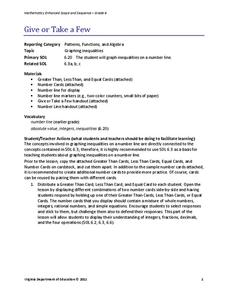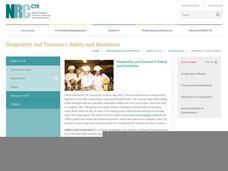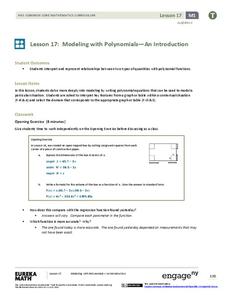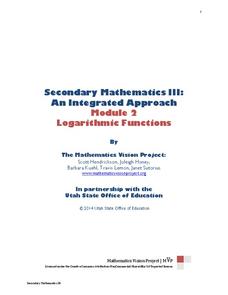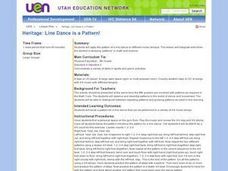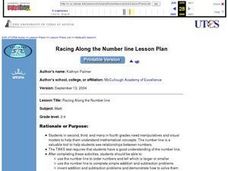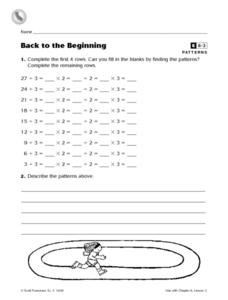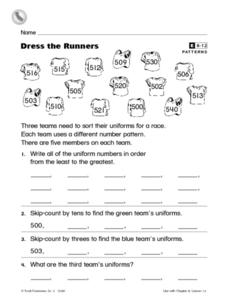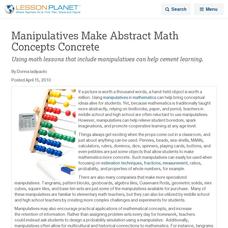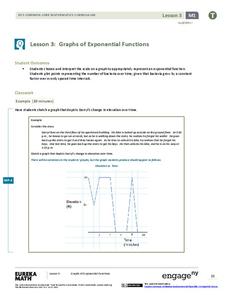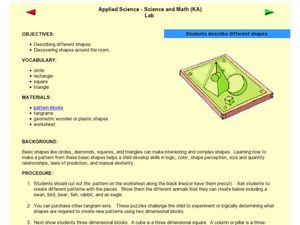Virginia Department of Education
Give or Take a Few
Young mathematicians extend their knowledge of rational numbers on a number line to graph inequalities by first using number cards to compare rational numbers. They finish by using similar reasoning to graph inequalities on a number line.
Virginia Department of Education
Solving and Graphing Inequalities
You can't go wrong with a lesson plan that involves candy! Learners solve and graph one-variable inequalities and use candy to graph the solution. Individuals associate open circle graphs with life savers and closed circle graphs with...
National Research Center for Career and Technical Education
Hospitality and Tourism 1: Safety and Sanitation
Math and science come alive in this career-related instructional activity on sanitation. Along the way, learners explore bacterial growth rates using exponential notation and graphs. A link to a very brief, but vivid video shows just how...
EngageNY
Numbers Raised to the Zeroth Power
What in the world is the zeroth power? Examine the patterns of exponents as they apply to the zeroth power. Scholars apply the zero property to simple exponential expressions in this fourth lesson plan in a series of 15. The examples...
EngageNY
Modeling with Polynomials—An Introduction (part 2)
Linear, quadratic, and now cubic functions can model real-life patterns. High schoolers create cubic regression equations to model different scenarios. They then use the regression equations to make predictions.
EngageNY
When Can We Reverse a Transformation? 1
Wait, let's start over — teach your class how to return to the beginning. The first instructional activity looking at inverse matrices introduces the concept of being able to undo a matrix transformation. Learners work with matrices with...
Virginia Department of Education
Balanced
Bring balance to your lesson plans with an activity that asks individuals to solve one-step linear equations with inverse operations. Balance scales help learners understand the concept of isolating the variable.
Mathematics Vision Project
Module 2: Logarithmic Functions
Build a solid understanding of logarithmic functions and equations. Five lessons in the module begin by developing the concept of a logarithm. The next lessons address graphing logarithmic functions, logarithmic properties, and solving...
Curated OER
Heritage: Line Dance is a Pattern!
Line dancing is the repeating of a pattern of steps, done to music. Teach youngsters how to line dance and they won't feel so awkward when they grow up. Let them experiment with creating their own patterns and teaching their classmates....
Curated OER
Add It Up In Number Ville! Adding 2-Digit Numbers With and Without Regrouping
Students explore adding 2-digit numbers. In this math lesson, students identify 2-digit numbers and use base ten blocks to practice adding. Students use addition to break a code.
Curated OER
Racing Along the Number Line
Manipulatives and visual models really help youngsters understand mathematical concepts. One activity provided here gives every learner their own white board and accompanying number. Then learners have to put themselves in order, holding...
Curated OER
Fun With Calendars
Students use four numbers to find calendar dates that form square numbers. In this square numbers lesson, students use algebraic equations to calculate and locate number patterns using a monthly calendar.
Curated OER
Back to the Beginning
In this number pattern worksheet, 4th graders fill in the number sentence while looking for a pattern. The 9 number sentences are made up of multiplication and division problems. Also students are asked to provide a short response...
Curated OER
Dress the Runners
In this number patterns worksheet, students write 16 three digit uniform numbers in order from least to greatest. Students then skip count by tens and threes using those same numbers.
Curated OER
Algebraic Processes And Its Connections To Geometry
Youngsters explore number patterns within a Hundreds Chart. They discover six specific patterns from six teacher-directed rules in cooperative groups and describe in words ONE of the three patterns in their Learning Logs. They prove for...
Curated OER
The Human Body
Explore the human body through hands-on activities. Young learners will trace their bodies and place cut out body organs in the proper place, print patterns using cut fruit, sing songs about good nutrition, and use their five senses...
Curated OER
Manipulatives Make Abstract Math Concepts Concrete
Using math lessons that include manipulatives can help cement learning.
Pennsylvania Department of Education
Playing with Patterns
Students use objects and symbols to create original linear patterns. In this patterns lesson plan, students also translate patterns from one modality to another.
Curated OER
Calculating Patterns
Learners create numerical patterns by using an internet based calculator. In this patterns lesson plan, students complete, create, extend, and record different patterns.
EngageNY
Graphs of Exponential Functions
What does an exponential pattern look like in real life? After viewing a video of the population growth of bacteria, learners use the real-life scenario to collect data and graph the result. Their conclusion should be a new type of graph...
Curated OER
Rhythm, Math, Rhythm
Students play instruments in math class to learn the interconnectedness between math and music. In this math lesson, students subdivide a piece of music, clapping rhythms and charting rhythm patterns in the song. A guided discussion...
EngageNY
Why Do Banks Pay YOU to Provide Their Services?
How does a bank make money? That is the question at the based of a lesson that explores the methods banks use to calculate interest. Groups compare the linear simple interest pattern with the exponential compound interest pattern.
Curated OER
Pattern Block Fractions
Fourth graders participate in a lesson that is about the finding of different fractional sizes with the help of pattern blocks. They define the vocabulary terms of numerator and denominator. The lesson also uses geometry and relates it...
Curated OER
Applied Science - Science and Math (K) Lab
In this shape lesson, learners cut out tangram shapes and create different pictures with them. They look at 3-D shapes as well. There is a nice, hands-on component built into this lesson.


